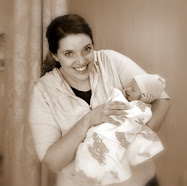This is a really good point. If you want an unmedicated birth, change the words, "I will try to go natural" to "I will prepare to go natural."
You will hear many women say they are going to "try" to have an unmedicated birth. To me, "trying" connotes sheer effort and endurance. What I hear women say when they say "try" is that they are just going to see how long they can stand the pain. My dictionary defines "to try" as "to make an attempt or effort". What happens when you try something? Either you can succeed or fail.
There's a lot of derisive talk out there about birth plans and women who "plan" an unmedicated birth - or really plan anything about their birth at all. There is a lot of fingerwaving about how birth is unpredictable and you can't PLAN anything. After seeing a lot of births, I have to say I agree. My dictionary says to plan is to "decide on and arrange in advance" - you can't really do that with your birth. What happens when you plan something? Maybe your plans work out, and maybe they don't.
What I wish more women would say, and take ownership of, is that they are preparing for an unmedicated birth. My dictionary says " to prepare" is "to make ready or able to do or deal with something".This sounds just about right! Someone who is prepared does not fail or have plans not work out - they meet what comes with their goal in mind. They have made themselves ready to handle birth and any twists and turns they might meet on the way.
I encourage women to think of birth as a marathon - it is long, challenging, sometimes painful, sometimes exciting, and can be very rewarding. Many people regard having run a marathon as difficult, but very rewarding and a huge achievement. However, if you knew someone who told you that on Saturday they were going to "try" to run a marathon, you'd probably look at them a little askance. You'd start asking questions: "Have you practiced? Did you read up about marathoning and long-distance running? Do you know anything about the route?"
What would you think if they said, "I'm just going to start running and see how long I can stand it. There will be people along the way to tell me where to go." You might have some more questions for them. "Don't you think that at some point you're going to get exhausted and want to quit? If you haven't prepared, how will you have the resources to keep going? Wouldn't you like to know something about the course - where the steep hills are, where to save your energy, where to expect things will be tough?"
If this person then tried to run a marathon, and dropped out at mile 10, or had a miserable time, and then told their friends how horrible marathons were and how stupid someone would have to be to go through that awful experience just to prove they were "tough"...wouldn't you be skeptical about their opinion? And yet that's where we're at in a lot of ways. Many women see unmedicated birth as some kind of test that you pass via sheer endurance and "feminist masochism", as one doctor in "The Business of Being Born" puts it. There's often a vague, generalized perception that drug-free is "better", but without much clear understanding of the actual risks of drugs. If you "try" to have the unmedicated birth and "fail", then you have a lot invested in trying to convince people that this "test" is silly and has no bearing on your strength, motherhood, or womanhood (a position I agree with completely). I think many of the birth horror stories and dismissive "just take the epidural, honey, you're gonna need it" comments that pregnant women here come from that place.
On the other hand, if you approach natural birth with the mindset that this is a rare and challenging event that you would like to fully experience, with interventions available whose risks you'd prefer to avoid, you can prepare for it. You can take classes, read, and find good coaches and support systems. You can remain flexible and open to changes in the situation. Let's ditch this whole "trying" thing and switch to "preparing".
There's a lot of derisive talk out there about birth plans and women who "plan" an unmedicated birth - or really plan anything about their birth at all. There is a lot of fingerwaving about how birth is unpredictable and you can't PLAN anything. After seeing a lot of births, I have to say I agree. My dictionary says to plan is to "decide on and arrange in advance" - you can't really do that with your birth. What happens when you plan something? Maybe your plans work out, and maybe they don't.
What I wish more women would say, and take ownership of, is that they are preparing for an unmedicated birth. My dictionary says " to prepare" is "to make ready or able to do or deal with something".This sounds just about right! Someone who is prepared does not fail or have plans not work out - they meet what comes with their goal in mind. They have made themselves ready to handle birth and any twists and turns they might meet on the way.
I encourage women to think of birth as a marathon - it is long, challenging, sometimes painful, sometimes exciting, and can be very rewarding. Many people regard having run a marathon as difficult, but very rewarding and a huge achievement. However, if you knew someone who told you that on Saturday they were going to "try" to run a marathon, you'd probably look at them a little askance. You'd start asking questions: "Have you practiced? Did you read up about marathoning and long-distance running? Do you know anything about the route?"
What would you think if they said, "I'm just going to start running and see how long I can stand it. There will be people along the way to tell me where to go." You might have some more questions for them. "Don't you think that at some point you're going to get exhausted and want to quit? If you haven't prepared, how will you have the resources to keep going? Wouldn't you like to know something about the course - where the steep hills are, where to save your energy, where to expect things will be tough?"
If this person then tried to run a marathon, and dropped out at mile 10, or had a miserable time, and then told their friends how horrible marathons were and how stupid someone would have to be to go through that awful experience just to prove they were "tough"...wouldn't you be skeptical about their opinion? And yet that's where we're at in a lot of ways. Many women see unmedicated birth as some kind of test that you pass via sheer endurance and "feminist masochism", as one doctor in "The Business of Being Born" puts it. There's often a vague, generalized perception that drug-free is "better", but without much clear understanding of the actual risks of drugs. If you "try" to have the unmedicated birth and "fail", then you have a lot invested in trying to convince people that this "test" is silly and has no bearing on your strength, motherhood, or womanhood (a position I agree with completely). I think many of the birth horror stories and dismissive "just take the epidural, honey, you're gonna need it" comments that pregnant women here come from that place.
On the other hand, if you approach natural birth with the mindset that this is a rare and challenging event that you would like to fully experience, with interventions available whose risks you'd prefer to avoid, you can prepare for it. You can take classes, read, and find good coaches and support systems. You can remain flexible and open to changes in the situation. Let's ditch this whole "trying" thing and switch to "preparing".


